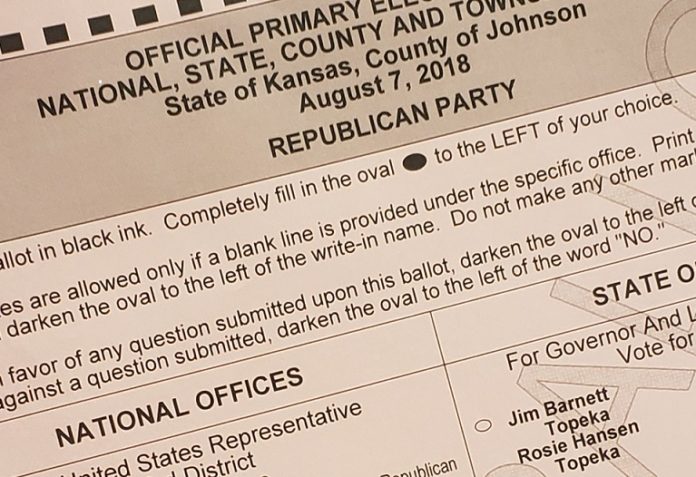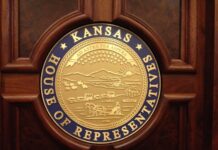A bill moving up the deadline for advanced ballots sent to election offices cleared a Senate committee Friday amid accusations it would suppress voter turnout.
The Senate Federal and State Affairs Committee approved a bill setting a deadline of 7 p.m. on Election Day for the delivery of advanced mail ballots.
The law now allows advanced ballots to be delivered to election officials up until three days after the election so long as they are postmarked on or before Election Day.
“This law is point blank a voter-suppression law. There is no other way to characterize it,” said Democratic state Sen. Ethan Corson of Prairie Village.
“The only reason we would pass this law is to make it harder for Kansans to vote,” Corson told the committee.
The secretary of state’s office reported that more than 32,000 ballots came into election offices after last year’s general election.
The office reported that 17,224 postmarked ballots came in on the Wednesday after last fall’s election, 10,790 were returned the Thursday after the election and 4,353 came in on that Friday following the election.
“It’s just undeniable that this bill would disenfranchise thousands of Kansans,” said voting rights activist Davis Hammet.
Supporters of the bill said it would reduce the risk of voters casting a ballot after Election Day although there’s no evidence to suggest that’s already occurring.
They also said it would ease the mind of voters who see vote tallies change as advanced ballots are counted after the election.
“When is an election over and how much time should we give them?” asked Republican state Sen. Larry Alley, chair of the committee.
“Could we extend to it Thanksgiving? Could we extend it to Christmas? We have to have a date whether that date is Nov. 3…or whether it is three days past that.”
Democratic state Sen. Mary Ware accused the committee of packaging together a series billls aimed at keeping Kansans from voting.
Ware pointed to bills passed by the committee on Thursday that moved up the deadline for sending out advanced ballots from 20 days to 15 days and limited to five the number of ballots that can delivered to the election office on behalf of someone else.
“There are a lot of people saying that these bills curtail their rights and that’s the aim,” the Wichita Democrat said. “I really hope we can prove them wrong.”
Alley, of Winfield, took sharp exception to Ware’s comments.
“That is not my intent,” Alley said. “I want to make sure we have a fair election. I want to have transparent elections and I want to make sure we have a secure election.”
A similar bill was introduced in the House but died in a committee.
The version in the Senate was introduced Thursday and a hearing was held Friday when it was moved out to the full chamber to consider.
It’s supporters included Republican state Rep. Charlotte Esau of Olathe and former state Sen. Eric Rucker, who now works as the chief of staff for Senate Majority Leader Gene Suellentrop.
Rucker, who worked for former Secretary of State Kris Kobach, suggested that the current law opens the door to voting after Election Day.
“Election Day should be the date that voting concludes,” Rucker said.
“Election Day should serve as the date that the casting of ballots ends and the finalizing of election results begins,” he said.
Corson pressed Rucker for evidence that Kansans were voting after the election in violation of the law.
“Any time that the possibility exists under current law that an individual could vote after the polls close on Election Day, that’s casting,” he said.
Rucker said the lack of standardized postmarking and bar codes showing when a ballot was sent could allow votes to be cast after Election Day
“If you allow receipt of an advanced mail ballot up to three days after the election, it could be cast after Election Day, on Election Day after the polls close, it coud then be received and it could be counted,” he said.
Corson pressed Rucker again.
“It could be, but you have no evidence that in Kansas that is happening,” Corson replied.
“You have nothing to present to the committee that’s happened or is happening – just that it could hypothetically happen,” he said.
Esau said voters don’t trust election results that change as advanced ballots are counted after the election.
“This year, folks have not had a lot of faith in the post office to deliver things in a timely manner,” Esau said.
“We have people that are concerned. They see the results of the election and they see them changing after the polls are closed,” she said.
“We are undermining their faith in the election results.”
But Hammet said a slow postal service is not a reason to move up the deadline.
The bill, he said, “is simply the government punishing citizens for the shortcomings of the government.”















